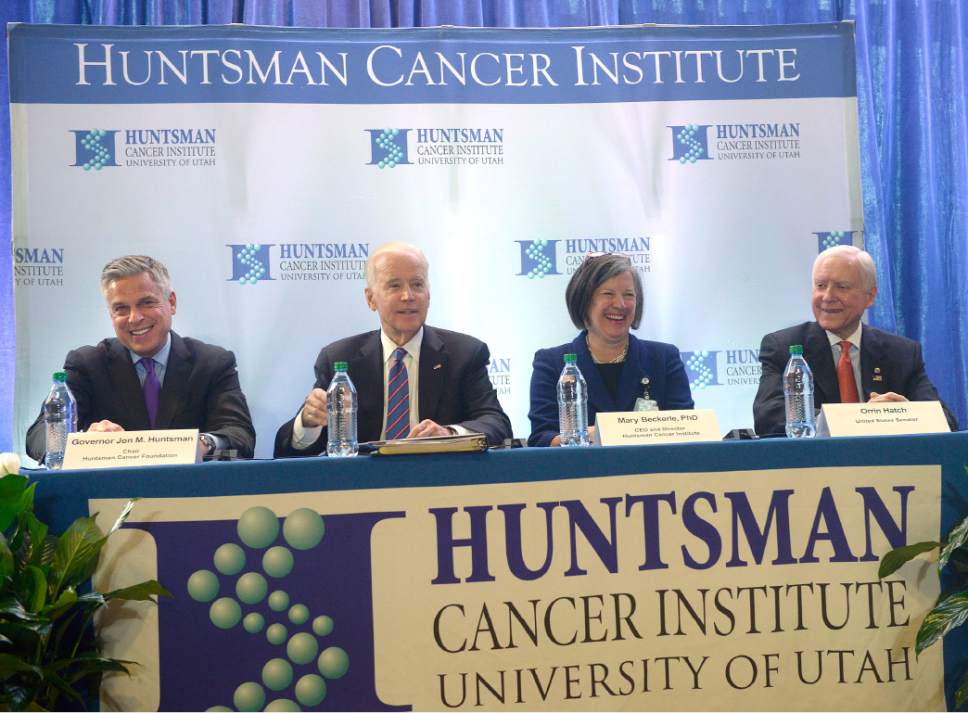This is an archived article that was published on sltrib.com in 2016, and information in the article may be outdated. It is provided only for personal research purposes and may not be reprinted.
Eyebrows were raised when President-elect Donald Trump added to his growing list of secretary of state candidates Jon Huntsman, former governor of Utah and ambassador to China and a rival of Mitt Romney for the honor of being state's most prominent political face.
There has been wild speculation since Trump first hinted that Romney was on his short list for the job about the motives of the irascible, gloating soon-to-be leader of the free world.
After all, Romney was one of Trump's harshest critics during the campaign for the Republican nomination, calling the billionaire reality TV star a con man and a fraud. Trump responded in kind, dubbing Romney as a loser.
Then Trump won and later floated the suggestion that Romney could be secretary of state.
Trump surrogates have blasted Romney since their boss floated the idea of a cabinet post while Trump continued to reel his new admirer toward the boat.
It made many wonder if Trump was doing all this to simply humiliate Romney, to have him fawn and swallow his past cruel words, all while the cameras were clicking.
Then, to add insult to injury, he adds Huntsman to his short list, a dagger in the back of Romney since he and Huntsman are both Utah heroes and only one can emerge at the top of the hill.
Perhaps neither will be chosen for the job. But the addition of Huntsman gave Trump one more slap on Romney's cheek.
Then again, maybe something else is going on with the emergence of Huntsman into the mix.
Let's introduce one more player to the game: Sen. Orrin Hatch.
Hatch has indicated recently that he is seriously considering breaking his 2012 promise that would be his last re-election bid and he would not run in 2018.
Several Republicans are circling around the seven-term incumbent, believing he is vulnerable this time around.
But never underestimate Hatch.
Consider the timing of the Huntsman inclusion in the inner circle of Secretary of State possibilities.
Huntsman has recently moved his family back to Utah after being domiciled in the east following his stint in China. Within the past couple of weeks, he has expressed an interest in interviews about running for Hatch's seat in 2018.
Huntsman said in the interviews that he admires Hatch and the job he has done, and his potential run for the seat would hinge on Hatch deciding to retire.
But he has put his name out there, and it would not be too much of a reach to speculate that he would generate considerable support to run even if Hatch gives it a go.
Then, after Huntsman's trial balloon for the Senate in 2018, Trump puts him on his short list.
Could Hatch have made a little personal call to the president-elect, reminding him that he, Hatch, was one of Trump's early supporters when most prominent Republicans were still shunning him?
Could Hatch have reminded Trump that he, Hatch, is one of the most powerful members of the Senate and a valuable ally in the body's Republican caucus where Trump will need support for his Supreme Court nominees?
Could Hatch have reminded Trump that he, Hatch, is chairman of the extremely important Senate Finance Committee, one of the front lines of any tax reform battle?
So with all those reasons to keep Hatch happy, who knows? If Huntsman is named Secretary of State, he for sure won't run against Hatch in two years.
The good senator has been known to discourage challenges from potential Republican foes in the past.
When then State Rep. Stephen Urquhart began actively gearing up to challenge Hatch for the Republican nomination in 2006, Urquhart, a St. George attorney, began hearing that some of his firm's clients were getting telephone calls questioning their loyalty to Hatch if their lawyer was going to run against him.
Urquhart eventually decided to stay in the Legislature and, two years later, moved from the state House of Representatives to the state Senate.
Fast forward to 2011, when Congressman Jason Chaffetz was calling around to conservative groups trying to garner support for his possible challenge to Hatch in the Republican convention the following year.
Chaffetz went on a family vacation and promised a major announcement when he returned. So when he landed back in Utah and held his press conference, reporters expected he would announce a challenge to Hatch.
Instead, he surprised everyone by saying he could be more effective by staying in the House.
The result of a few well-placed telephone calls by the Hatch camp, perhaps? That definitely was the scuttlebutt at the time.
After Chaffetz's decision, then-state Sen. Dan Liljenquist became the conservatives' choice to unseat Hatch in the GOP primary. He seemed to have some strong support and momentum from his initiatives in the state Legislalture on pension and health care reforms.
But some of Liljenquist's supporters began hearing from their employers about concerns they could hurt their relationships with the powerful Sen. Hatch.
Much of the challenger's early momentum was suddenly doused.
And the wily and durable Hatch prevailed once again. —



